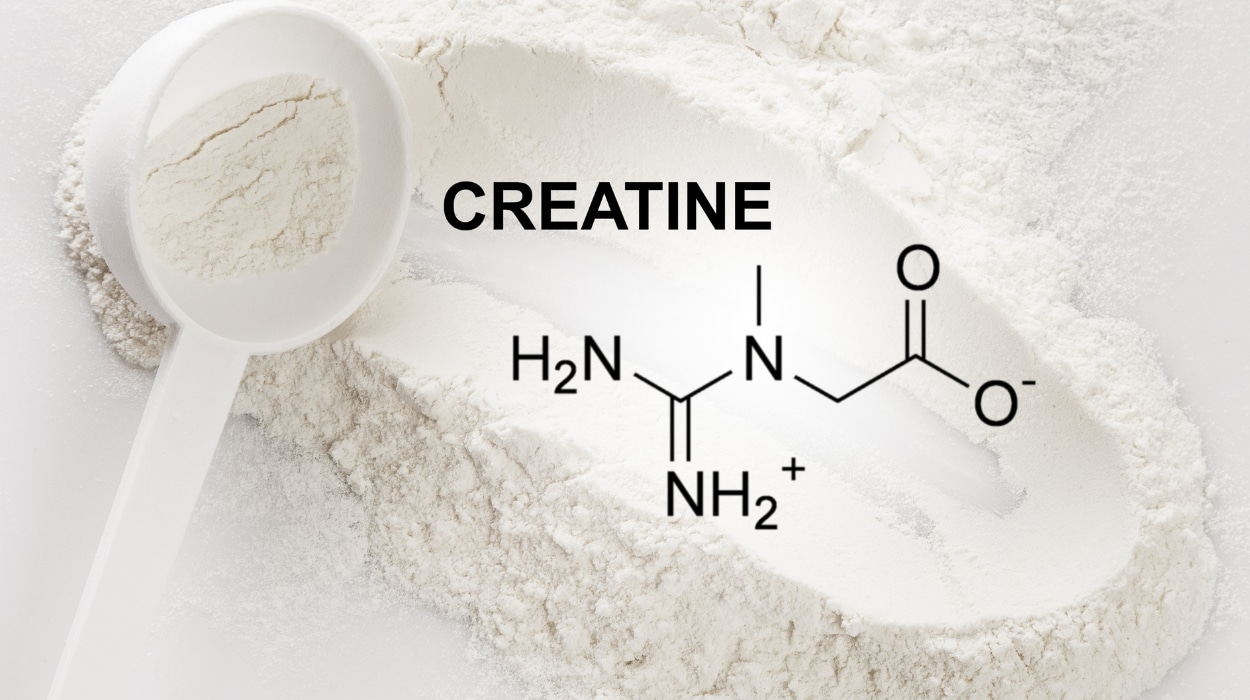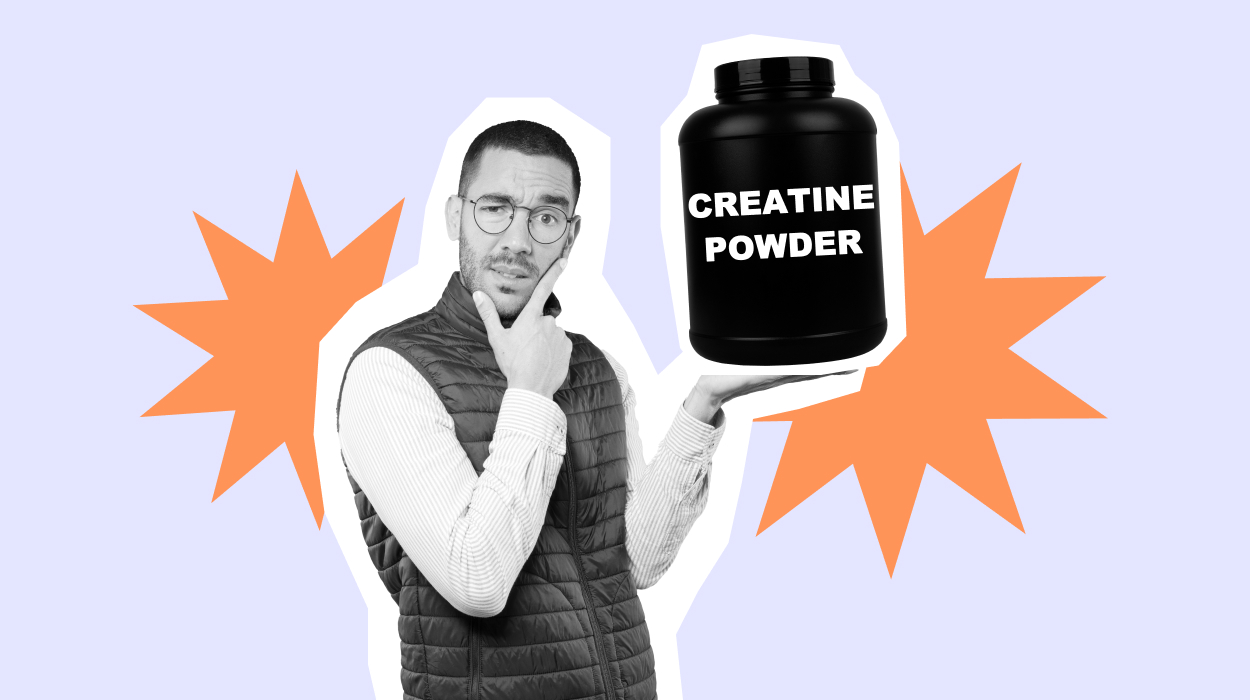The route toward weight loss might be among the most challenging and intimidating. When constant exercise, a balanced diet, and drinking water do not provide the intended results, frustration and a lack of hope may arise. In the circumstances like these, weight loss supplements are intended to support your weight loss efforts. They might give you greater willpower to persevere and achieve your weight loss goals physically and mentally. Due to the overwhelming selection of available dietary supplements, choosing the ideal one might take a lot of work. One such product is creatine. This nutritional supplement will be carefully examined in this article, including its roles, elements, benefits for health, methods of usage, potential drawbacks, and much more.
A creatine supplement is designed to increase muscle growth, lean muscle mass, and enhance athletic performance. Creatine supplementation is among active people’s most reputable products, such as gym goers and athletes. According to the manufacturer’s instructions, taking creatine supplements can offer noticeable results when used properly. Despite being associated with muscle growth and lean muscle mass, creatine supplementation can also be used in losing weight. This article focuses on describing how taking creatine supplements can help lose weight.
Does Creatine Help You Lose Weight?
Typically, creatine is not seen as a weight loss supplement since people use it to enhance muscle strength and power, especially when lifting weights or other forms of physical training. However, creatine can indirectly support weight loss and help you lose excess body weight, especially if you are seeking to burn some belly fat since you train more effectively to burn fat with increased physical and muscle stamina.
Creatine For Weight Loss: Does It Work?
Is creatine good for weight loss? Yes. Using creatine for weight loss can help you lose excess body weight. Typically, creatine is not seen as a weight loss supplement since people use it to enhance muscle strength and power, especially when lifting weights or other forms of physical training. A study[1] indicates that taking creatine can also help you lose some body fat. Creatine products are designed to improve muscle growth, build lean muscle mass, and even prevent muscle cramps.
Taking creatine for weight loss can be an excellent option if you are seeking to burn some belly fat. You train more effectively to achieve fat loss with increased physical and muscle stamina. While weight loss might be your healthy weight ticket, remember to consult a healthcare provider before using any dietary supplements to reduce body fat and boost or alleviate various health conditions.
What Is Creatine?

Creatine is an amino acid found mostly in the muscles and brain. By sustaining production in active muscles, creatine aids in ensuring a steady supply of energy to working muscles. You can also find little amounts in your heart, brain, and other tissues. Additionally, foods like milk, red meat, and seafood contain creatine. On the other hand, you can nourish the body with creatine by consuming artificially made creatine supplementation. It primarily stores creatine in the muscles as phosphocreatine and utilizes it as energy. Therefore you can orally consume creatine to increase muscle mass and improve exercise performance. A creatine supplement can also alleviate symptoms related to various health conditions such as congestive heart failure, neuromuscular and brain disorders, and many more. Taking creatine supplementation topically can boost skin health.
Creatine phosphate[2] is vital for the body’s natural ability to produce energy. This is because ATP (Adenosine Triphosphate) is a primary energy source for the cells. Study indicates that creatine supplements[3] can enhance workout performance, increase muscle strength[4] and power, and overall exercise performance. Other studies[5] show that taking oral creatine supplementation can alleviate mental fatigue. These benefits occur when the creatine phosphate increases in your muscle cells after taking oral creatine supplements.
Different Types Of Creatine
Studies[5] show that taking creatine supplements can alleviate mental and physical fatigue. These health benefits occur when creatine phosphate in the cells is boosted. Additionally, various forms of creatine supplementation make choosing feel overwhelming. The following is a list of types of creatine:
- Creatine Monohydrate is the most common creatine supplement. This type of creatine Supplementation has been applied in numerous creatine research.[6] Creatine monohydrate is associated with enhancing exercise performance.[4] It is made of water and creatine molecules. When the water is removed, it increases creatine content, resulting in creatine anhydrous. Creatine monohydrate increases the water amount in the muscle cells, which helps in muscle growth. Also, creatine can be micronized[7] to boost water solubility, which enhances the body’s absorption ability. Despite different methods of processing, this creatine supplementation is effective.
- Creatine Ethyl Ester is among the most reputable forms of Creatine supplementation. Creatine Ethyl Ester[8] is absorbed more effectively in the body, the monohydrate type. However, some studies[9] indicate that there are better options for boosting creatine content in the body than this type of creatine.
- Creatine Hydrochloride has high solubility; therefore, a lower dosage is effective.
- Buffered creatine is created by manufacturers who aim to boost creatine stability in the stomach; they add alkaline powder. They claim that buffered creatine has high potency and minimizes the risk of cramping and bloating. Regardless, a report[10] compared monohydrate and buffered creatine and suggested differences in side effects or efficacy.
- Liquid creatine is a ready-to-drink form of creatine supplementation. Although limited, research[11] indicates that this type has less potency compared to monohydrates.
- Creatine Magnesium Chelate is “chelated” with magnesium. This implies that each creatine molecule is linked with magnesium. Research shows that these forms of creatine supplements[12] can improve athletic performance like monohydrate; however, the latter is more effective.
What Are The Health Benefits Of Creatine?

Creatine offers various health benefits, including:
- Boosting energy levels[13]: creatine products enhance ATP levels by increasing phosphocreatine connection. ATP fuels the body during a strenuous workout due to high energy levels.
- Promotes muscle functionality[14]: creatine is vital for muscle protein synthesis, which leads to the development of new muscle fibers[15] and muscle mass.[15] Studies suggest that creatine lowers stunting hormone levels; myostatin[16] helps you build muscle faster.
- Enhances athletic performance[17]: Since it increases ATP production, creatine can boost brain performance, muscle endurance and strength, muscle recovery, ballistic power, mental focus and stamina, and sprint and ballistic power.
- Boosts muscle development[18]: Creatine can increase the long-term and short-term growth of muscle mass.
- Alleviate symptoms related to Parkinson’s disease.[19]
- Might combat neurological health conditions such as epilepsy, Alzheimer’s, brain injury, or ischemic stroke.
- Diabetes management blood sugar levels by lowering blood sugar levels.
- Boosts brain function.[20]
- Alleviate mental and physical fatigue.[21]
How Much Creatine Should You Take?
Always follow the manufacturer’s instructions, whether you are trying to lose some body fat or gain muscle mass. Since the most popular and well-researched type of creatine is monohydrate, we shall discuss how to use it. According to ISSN,[22] the recommended dosage for monohydrate is taking creatine four times daily for at least five days every week. The dosage might depend on your body weight; therefore, you can determine the daily dosage[22] by multiplying 0.3 by your weight. Taking creatine supplementation[22] for four consecutive weeks is a powerful saturation to your muscles. After your body is fully saturated, you can use a lower dosage to maintain healthy creatine stores.
Side Effects Of Creatine
You can use creatine products to reduce body fat or gain weight; however, there might be possible side effects, just like any other dietary supplement. Research[6] shows that dehydration and muscle cramps are among the most reported side effects of taking creatine. These symptoms might be caused by poor hydration, multiple supplement consumption, or excessive heat. It is vital to hydrate when using creatine properly. Others experience weight gain[6] when using these supplements.
This is because creatine naturally enhances the muscles’ water retention ability; this body weight change should not be mistaken for fat mass accumulation. This weight gain reduces after a while when you are lifting weights or any other form of weight training. Also, creatine supplements are claimed to increase body fat[6]; however, this can help in lean muscle development. Creatine products might cause dehydration when consumed alongside caffeine.[23]
If you have any underlying medical condition, such as Parkinson’s disease, kidney disease, or bipolar, you should avoid using this dietary supplement.
Can Creatine Make You Gain Weight?
Some people claim that taking creatine affects the body’s fat mass. Others even complain that after consuming creatine, they feel swollen or plumper. While it is affirmative that creatine can result in weight gain, the additional weight is not fat. It could be due to water weight gain—creatine results in fluid retention, which occurs when the supplement accumulates water into the muscle cells. When the muscle retains this water, you will likely feel puffiness in the stomach or limbs.
This unwanted weight gain might be a result of increased muscle mass. Creatine increases muscle endurance and strength. You might notice an increment in muscle size and strength after using creatine. You might also experience this due to non-muscle weight gain, aka fat. This does not imply that creatine will make you fat since a scoop of creatine has little to zero calories. If you take creatine supplementation combined with a healthy diet and proper exercise, you can use the strength from creatine to work out and enhance the fat-burning process.
Tips For Healthier Cutting
Cutting is eating less and attempting to lose body fat while maintaining muscle mass. Unfortunately, restricting calories and increasing activity can be stressful, even at the best of times.
Keeping this in mind, most people experiment with various training schedules, diets, and any tips and tactics they may uncover to acquire an edge during their cut. For beginners, this cutting advice means less trial and error and, ultimately, a better cutting phase that produces better outcomes.
- Proper hydration
- Use cardio to increase calorie deficit
- Home-cooked meals
- Avoid sugar
- Avoid cheat meals
- Drink caffeine moderately
- Increase fiber and protein intake
Conclusion
Creatine can promote weight loss and gain. It increases muscular endurance and strength required to burn calories even at rest. It also increases energy levels which can facilitate weight loss by burning more calories. Creatine increases muscle water retention, which results in weight gain due to increased muscle size and mass. You can reap prominent health benefits from using creatine products. Whether for weight loss or gaining weight, creatine is an excellent dietary supplement to boost your weight goals and improve your overall health.
Frequently Asked Questions
Yes. It is naturally found in the body and can be obtained through supplementation.
The FDA has not approved any dietary supplement.
Red meat and fish are among the most common sources of creatine.
It is better to consume creatine on an empty stomach since it will be easily absorbed.
The best time is after an exercise. Also, creatine is a great post-workout meal combined with high protein or high-carb foods.
Creatine increases muscle endurance and strength, which helps in calorie and fat burning.
Yes. Creatine can make you gain weight through water retention in the muscles, muscle gain, and non-muscle weight gain.
Creatine should not be taken by anyone who has a liver illness, high blood pressure, or kidney disease.
 Expert's opinion
Expert's opinion
